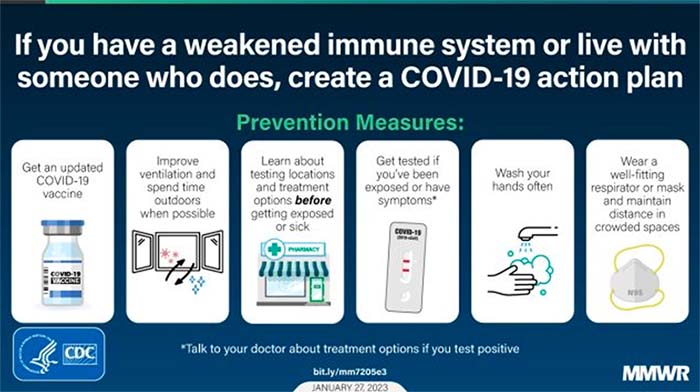Infectious diseases pose a significant threat to individuals with weakened immune systems, known as the immunocompromised. Whether they are undergoing chemotherapy, organ transplantation, or living with certain chronic conditions, the immunocompromised are at a higher risk of severe complications and mortality from infectious diseases.
To safeguard their health, it is crucial to prioritize infectious disease testing for this vulnerable population. In this article, we explore the importance of infectious disease testing in protecting the immunocompromised and highlight the role it plays in promoting their well-being in the context of the ongoing COVID-19 pandemic and beyond.
Understanding Immunocompromised Individuals
Immunocompromised individuals have weakened immune systems, making them more susceptible to infections. This group includes individuals with conditions such as HIV/AIDS, cancer, autoimmune disorders, and those taking immunosuppressive medications. For them, even a seemingly mild infection can lead to serious health consequences, which is why it is imperative to detect and manage infectious diseases promptly through regular testing.
"The COVID-19 pandemic has disproportionately impacted immunocompromised patients. This diverse group is at increased risk for impaired vaccine responses, progression to severe disease, prolonged hospitalizations and deaths.” — “Vaccines and therapeutics for immunocompromised patients with COVID-19,” eClinicalMedicine
Regular infectious disease testing has numerous benefits for the immunocompromised community including early detection and treatment, preventing disease transmission, tailoring vaccination strategies, monitoring progression, and helps this population avoid unnecessary use of antibiotics.
Early Detection and Treatment
Timely detection of infectious diseases in the immunocompromised is crucial for initiating prompt treatment. Tests such as blood cultures, viral load monitoring, and serological assays help identify pathogens and guide appropriate therapeutic interventions. Early diagnosis ensures that appropriate antimicrobial or antiviral therapies can be administered promptly, reducing the risk of severe complications.
Preventing Disease Transmission
Immunocompromised individuals are not only at higher risk of contracting infections but can also serve as reservoirs for the transmission of diseases. Comprehensive infectious disease testing helps identify asymptomatic carriers who may unknowingly spread pathogens. By identifying these carriers, appropriate preventive measures can be implemented to reduce the risk of transmission within healthcare settings, households, and the wider community.
Tailoring Vaccination Strategies
Immunization is a critical tool in preventing infectious diseases. However, the immunocompromised may have a reduced response to vaccines or specific contraindications due to their condition or treatments. Through infectious disease testing, healthcare professionals can assess the immune status of these individuals and determine the need for specialized or alternative vaccination strategies. This helps optimize immunization efforts and increase protection against vaccine-preventable diseases.
Monitoring Disease Progression
For immunocompromised individuals, the management of infectious diseases extends beyond initial diagnosis and treatment. Regular testing allows healthcare providers to monitor disease progression and treatment efficacy. Viral load testing, for example, helps track the response to antiviral therapies in individuals with HIV/AIDS. Monitoring disease markers enables healthcare professionals to make informed decisions regarding treatment adjustments and ensure the best possible outcomes for the immunocompromised.
Avoiding Unnecessary Antibiotic Use
Inappropriate use of antibiotics contributes to the development of antimicrobial resistance, a global health crisis. For the immunocompromised, misdiagnosing or overprescribing antibiotics can have severe consequences. Infectious disease testing helps differentiate between bacterial, viral, and fungal infections, allowing health care providers to prescribe targeted therapies and reduce the unnecessary use of antibiotics. This approach is essential in preventing antibiotic resistance and minimizing the risk of adverse effects in the immunocompromised population.
Immunocompromised Children
Immunocompromised children, due to their weakened immune systems, are generally considered to be at a higher risk of experiencing severe illness when exposed to infectious diseases, including COVID-19. (6)
Their compromised ability to fight off infections makes them more susceptible to contracting the virus or bacteria and experiencing more severe symptoms. This includes an increased risk of complications and a longer recovery period. (6)
However, it is important to note that the severity of the risk can vary depending on the specific condition and individual circumstances. Factors such as the type and extent of immunodeficiency, the child's overall health, and any underlying medical conditions can also influence their vulnerability. (6) As a result, it is crucial for healthcare providers, parents, and caregivers to work together to develop personalized strategies and precautions to protect immunocompromised children from potential exposures and provide them with appropriate care. (6)
Infectious disease testing is particularly important to this population, given the increased prevalence in pediatric patience of contracting illnesses amongst peers in setting of education and extracurricular activity. Schools, summer camps, and extracurricular activities can be breeding grounds for infectious disease spread. These kinds of environments need strategies in place to safeguard all children, it is important for administrators to consult local infectious disease experts as well as those specialized in pediatric patients with weakened immune systems.
Strategies for Safeguarding Immunocompromised Children at Summer Camps
Camps can implement several measures to ensure the well-being and protection of immunocompromised campers, allowing them to have a fulfilling and inclusive summer experience while minimizing the risk of infection.
Implement Health and Safety Protocols to Create a Controlled Environment
Rigorous hygiene practices such as regular handwashing, sanitization of surfaces, and proper respiratory etiquette can significantly reduce the spread of viruses. (7) Camp Program Administrators and Staff should be trained on these protocols and enforce them consistently throughout a campers experience during a program.
Adopt Screening Procedures to Identify and Mitigate Health Risks
Pre-camp health assessments may identify symptoms or potential exposures before campers arrive. Immunocompromised children can be given priority for early screening and testing to ensure they are not unknowingly carrying COVID-19 or other communicable viruses. By identifying and isolating any cases early on, camps can marginalize the spread of COVID-19 and help protect vulnerable campers.
Open Communication and Collaborative Care
Camp staff can facilitate open communication with parents and healthcare providers to address the specific needs of immunocompromised children. This includes collaborating with medical professionals to develop individualized care plans, educate staff on the unique challenges faced by these campers, and provide necessary medical support during the camp. Regular communication channels can be established to keep parents informed about any updates, precautions, or changes in the camp's operating procedures.
Reduce Social Stigma by Promoting Inclusivity
Importantly, camps can foster a supportive and inclusive atmosphere that promotes empathy, understanding, and acceptance among all campers. This helps create an environment where immunocompromised children feel comfortable and included, reducing any potential social stigma or isolation they may experience. By fostering positive relationships and educating other campers about immunocompromised conditions and the importance of inclusivity, summer camps can foster a sense of community and support for all campers, regardless of their health status.
Summer camps can play a vital role in supporting immunocompromised children by implementing rigorous health and safety measures, conducting thorough screenings, facilitating open communication, and creating inclusive environments.
By prioritizing the well-being of immunocompromised campers and taking appropriate precautions, camps can provide a safe and enriching experience that allows these children to participate in the joy and growth that summer camps offer.
The Immunocompromised and COVID-19 Testing
In the context of the ongoing COVID-19 pandemic, infectious disease testing has become even more critical for protecting the immunocompromised.
The availability of rapid antigen tests and polymerase chain reaction (PCR) tests has revolutionized the way we diagnose and manage infectious diseases, including COVID-19. These testing methods, along with innovative combination tests, have proven instrumental in safeguarding the health of the immunocompromised population.

Source: Centers for Disease Control and Prevention, January 2023 article
Early detection and treatment of COVID-19 are paramount for the immunocompromised. Rapid antigen tests provide quick results, often within minutes, allowing healthcare providers to identify infected individuals promptly. These tests detect specific proteins from the SARS-CoV-2 virus, enabling early intervention and reducing the risk of severe complications. PCR tests, on the other hand, offer higher sensitivity and specificity and are considered the gold standard for diagnosing COVID-19. They detect the genetic material of the virus and provide accurate results, even in individuals with a low viral load. Both rapid antigen tests and PCR tests have played a crucial role in preventing the spread of COVID-19 among the immunocompromised by facilitating early diagnosis and subsequent isolation or treatment.
In addition to single-target tests for COVID-19, combination tests have emerged as valuable tools in infectious disease testing. Companies like Lucira Health have developed innovative tests that can simultaneously detect multiple respiratory pathogens, such as COVID-19 and influenza.
“COVID-19 and flu viruses can both cause serious illness with similar symptoms, but each has unique prescription treatments that require diagnosis early in the infection to be effective. The inaccuracy of antigen COVID-19 tests makes such tests inadequate to use for early differential diagnosis of flu versus COVID-19,” said Erik Engelson, President and CEO of Lucira Health.
These combination tests offer a convenient and efficient way to diagnose both COVID-19 and other respiratory illnesses, allowing health care professionals to provide timely treatment and appropriate management strategies. By identifying the specific pathogens causing respiratory symptoms, healthcare professionals can tailor interventions, including antiviral treatments or supportive care, to address the specific needs of the immunocompromised individuals.
This timely treatment is often the difference between life and death for this community.
How Camp Programs Assess and Respond?
Recognizing the significance of infectious disease testing, is vital for Camp Programs that have enrolled campers that are different localities and communities. Facing an outbreak, program admins should have a full plan in place, assess, diagnose, implement a plan, and curtail any long-term closures and have resources situated ahead of time. Robust testing strategies, incorporating rapid antigen tests, PCR tests, and combination tests, along with serological assays for campers and administrators, can enhance the well-being of enjoyment of camp this summer.
Disclaimer: Peach Medical strongly recommends discussing any testing plans or protocols with a certified physician or healthcare professional before making any decisions. The information provided by Peach Medical is intended to be general in nature and is not a substitute for professional medical advice, diagnosis, or treatment.
Sources
- Centers for Disease Control and Prevention. (2020). Protecting Against Infections in Cancer Patients. Retrieved from cdc.gov/cancer/preventinfections/providers.htm
- Bhatt, R., et al. (2020). Management of Infections in Immunocompromised Patients. Medical Clinics of North America, 104(5), 915-932.
- Low, Y. M., et al. (2020). Immunization in the Immunocompromised Patient: An Update. Journal of Clinical Medicine, 9(2), 488.
- Awdishu, L., & Meisenberg, B. (2020). Management of Infectious Complications in Immunocompromised Patients. Medical Clinics of North America, 104(5), 961-979.
- Centers for Disease Control and Prevention. (2021). Antibiotic Use in the United States, 2018 Update: Progress and Opportunities. Retrieved from cdc.gov/antibiotic-use/stewardship-report/pdf/stewardship-report.pdf
- Impact Impact of COVID-19 on Pediatric Immunocompromised Patients. Retrieved from ncbi.nlm.nih.gov/pmc/articles/PMC8149202/
- Covid 19 Policies for Sale Schools. Retrieved from aap.org/en/pages/2019-novel-coronavirus-covid-19-infections/clinical-guidance/covid-19-planning-considerations-return-to-in-person-education-in-schools/
This blog is sponsored by Peach Medical.
Periodically, the American Camp Association (ACA) makes timely and relevant information about products and services available to its members so they can make informed decisions for their camps. However, the ACA does not endorse products, services, or companies.
The views and opinions expressed by contributors are their own and do not necessarily reflect the views of the American Camp Association or ACA employees.




